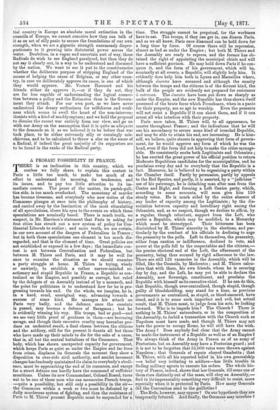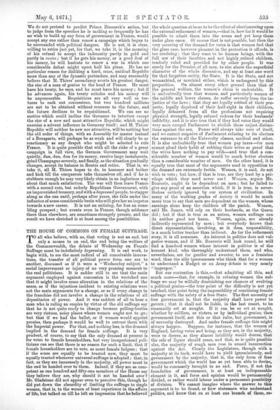APROSAIC POSSIBILITY IN FRANCE. T HERE is an inclination in this
country, which we confess we fully share, to explain this contest in Paris a little too much, to make too much of an effort to understand its meaning, its tendencies, and its issues, and to pay too little attention to its im- mediate course. The prose of the matter, its parish-poli7 tics side, is too much overlooked. The monotony of murder has become tiresome, and everybody who now writes of the Commune plunges at once into the philosophy of history, and carried away by the fascination of the most stimulating of all speculations, closes his eyes to the events on which those speculations are nominally based. There is much truth, we suspect, in Mr. Harrison's statement that Paris in asking for free cities has struck out a new system of policy for Con- tinental Liberals to realize ; and more truth, we are certain, in our own account of the dangers of Federalism in France ; but in both these speculations one element is too much dis- regarded, and that is the element of time. Great policies are not established or exposed in a few days ; the immediate con- test is not between Centralization and Federalism, but between M. Thiers and Paris, and it may be well for once to examine the situation as we should examine a party struggle at home. M. Thiers is trying, wisely or unwisely, to establish a rather narrow-minded re- actionary and stupid Republic in France, a- Republic as cen- tralized as the Empire, and possibly as corrupt, but ruled by the delegate of an Assembly instead of by a monarch, and the point for politicians is to understand how far he is pro- gressing towards his end. On the whole, we imagine, he is, in a hard, cruel, unoriginal way, advancing towards a success of some kind. He Manages his attack on Paris very badly, and the defence, once the enceinte is passed, may become a defence of Saragossa ; but he is evidently winning his way. His troops, bad or good—and we see very little proof of goodness in them—are becoming savage, and though their excessive cruelty may hereafter pro- duce an undesired result, a final chasm between the citizens and the 4oldiery, still for the present it daunts all but those who have made up their minds to die for the sake of a cause, that is, all but the central battalions of the Commune. That body, which has shown unexpected capacity for government, which keeps Paris as quiet as under the Empire and far freer from crime, displaces its Generals the moment they show a disposition to over-ride civil authority, and amidst incessant changes has fearlessly maintained its claim to everybody's obedi- ence, must be approaching the end of its resources, and except for a street defence can hardly have the command of sufficient munitions. Unless its new Commandant, Colonel Rossel, turns out to be one of those men who can mesmerize French troops, —quite a possibility, but still only a possibility in the air— the Commune within a week or two must be defeated by a dully murderous system of fighting, and then the resistance of Paris to M. Thiers' peasant Republic must be suspended for a time. The struggle cannot be perpetual, for the workmen have to eat. The troops, if they can get in, can disarm Paris, and as we all know, Paris once disarmed can be held down for a long time by force. Of course there will be repression, almost as bad as under the Empire ; but both M. Thiers and the Assembly are ready to repress, and the former has ob- tained the right of appointing the municipal chiefs and will have a sufficient garrison. He may hold down Paris if he con- quers it, and the form of his government, which will be, nominally at all events, a Republic, will slightly help him. It evidently does help him both in Lyons and Marseilles where, although e'meutes have occurred and although the enmity between the troops and the citizens is of the fiercest kind, the bulk of the people are evidently not prepared for resistance outrance. The eineutes have been put down as sharply as under the Empire, and the new Republic has thus shown itself possessed of the brute force which Frenchmen, when in a panic for their property, are so apt to worship. Even the peasants will not resist a Republic if it can shoot them, and if it can arrest all who interfere with their property.
Paris once taken, M. Thiers will, to all appearance, be master throughout France ; and the indications that he will use his ascendancy to secure some kind of ironclad Republic, and may be able to attain his end, are increasing. He is him- self, we believe, quite sincere in approving that form of govern- ment, for he would approve any form of which he was the head, even if the form did not help to make the cities manage- able. He consistently snubs both Legitimists and Orleanists ; he has exerted the great power of his official position to return Moderate Republican candidates for the municipalities, and he proclaims every day and to everybody that the Republic is a fact. Moreover, he is believed to be organizing a party within the Chamber itself. Partly by persuasion, partly by appeals to the Red Spectre, and partly, it is asserted, by a " judicious " use of his patronage, he is detaching man after man from the Centre and Right, and forming a Left Centre party, which, according to some accounts, will soon give him 120 steady votes. He is mach aided by the entire absence of any leader of capacity among the Legitimists ; by the dis- sociation between capacity and hereditary right among the Orleanists, and, as we suspect, though we decline to affirm, by a regular, though reluctant, support from the Left, who prefer a Republic, which may be modified, to a Monarchy which must be stereotyped. Their bitterness has been diminished by M. Thiers' sincerity in the elections, and par- ticularly by the conduct of his officials in declining to urge the peasantry to the polls. Left to themselves, the peasantry, either frojn caution or indifference, declined to vote, and power at the polls fell to the respectables and the citizens,— the precise electoral end of the Left, the effacement of the peasantry, being thus secured by rigid adherence to the law. There are still 123 vacancies in the Assembly, which will be filled, like the Councils, by Moderates ; and M. Thiers calcu- lates that with them, his own friends, whom he is securing day by day, and the Left, he may yet be able to declare the Assembly, now Sovereign, constituent, and proclaim the Republic with himself as its executive chief. If he can do this, that Republic, though over-centralized, though stupid, though guilty of bloodshedding, may stand for a time, as previous governments as centralized, as stupid, as blood-smeared, have stood, and it is to some such imperfect and evil, but actual result, that M. Thiers must, to judge from his acts, be looking forward. Who is to impede him The Church ? There is nothing in M. There' antecedents, or in the composition of the Assembly, to forbid a transaction with the Church such as Napoleon must have made, and though M. Thiers may not have the power to occupy Rome, he will still have the wish. The Army ? Does anybody feel clear that the Army cannot be made the instrument of a Republic as well as of an Empire We always think of the Army in France as of an army of Prestorians, but an Assembly may have a Praetorian guard ; and it is not to be forgotten that 55,000 votes were thrown against Napoleon ; that Generals of repute obeyed Gambetta ; that M. Thiers, with all his reported belief in his own generalship —a belief very irritating to soldiers—has little trouble in finding military agents to execute his orders. The whole his- tory of France, indeed, shows that her Generals, till some one of them rises distinctly out of the mass, will obey an Assembly,— find in its impersonality something very difficult to resist, more especially when it is protected by Paris. How many Generals did the Convention send to the guillotine ?
The Reds, however, may oppose ? On our hypothesis they are temporarily fettered. And finally, the Germans may interfere I We do not pretend to predict Prince Bismarck's action, but to judge from the speeches he is making so frequently he has no wish to build up any form of government in France, would accept any one rather than renew a campaign which began to be surrounded with political dangers. He is not, it is clear, willing to retire just yet, for that, we take it, is the meaning of his refusal to accept the indemnity partly in gold and partly in renter; but if he gets his money, or a good deal of his money, he will hesitate to renew a war in which one considerable defeat might upset half his plans. He has no particular reason for disliking a hard, crass, unidead Republic more than any of the dynastic pretenders, and may reasonably believe that M. Thiers' ascendancy averts his greatest danger, the rise of a man of genius to the head of France. He must have his treaty, he says, and he must have his money ; but if he advances again, his treaty exhales and his money will be unprocurable. Requisitions are all very well as tor- tures to rack out concessions, but two hundred millions are not to be obtained without recourse to the future, and the future declines to be requisitioned. We can see no motive which could incline the Germans to interfere except the rise of a new and most attractive Republic, which might exercise a solvent influence in Germany itself ; and M. Thiers' Republic will neither be new nor attractive, will be nothing but the old order of things, with an Assembly for master instead of a Bonaparte, will perhaps be as weak and will clearly be as reactionary as any despot who might be selected to rule France. It is quite possible that with all the risks of a great campaign in full view, the German Government may wait quietly, dun, dun, dun for its money, receive large instalments, grind Champagne severely, and finally, as the situation gradually changes, accept its balance in Rentes and retire. That is, we take it, all M. Thiers hopes to do, to hammer and bother and kick till the conquerors take themselves off, and if he is stubborn enough he may very likely obtain in an inglorious way about that much satisfaction. The war will then leave France with a second rate, but orderly Republican Government, with an impoverished treasury, and with a depressed people, to stagger along as she can until, perhaps after years, she falls under the influence of some considerable brain who will give her an impetus towards a new career. It is not an enticing, far less an enno- bling prospect ; but events even in France, though seldomer there than elsewhere, are sometimes strangely prosaic, and the result we have sketched is at least among the possibilities.

































 Previous page
Previous page